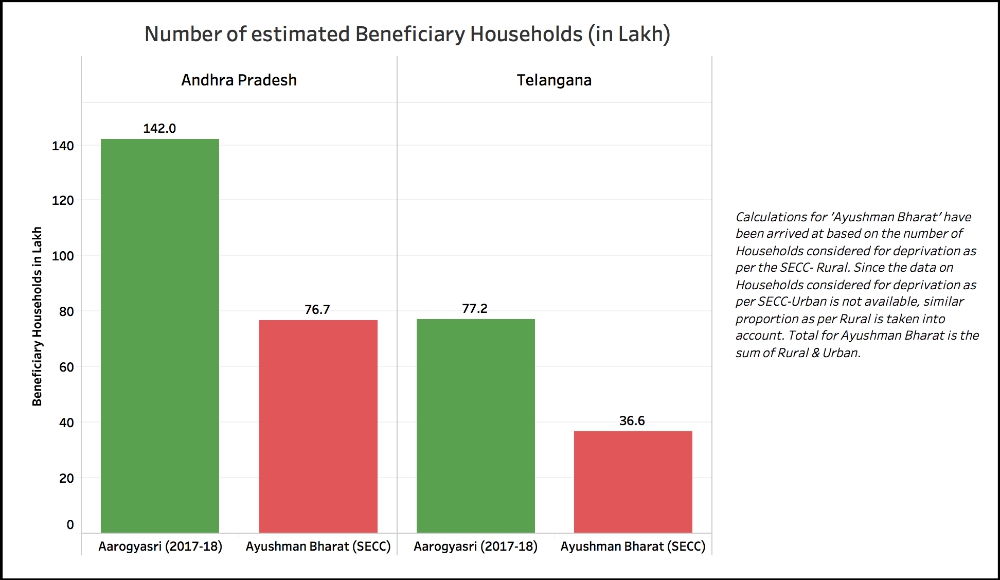[orc]Some states like Andhra Pradesh & Telangana have not signed a MoU for implementing the ‘Ayushman Bharat’ scheme. Here is looking at the reasons.
‘Ayushman Bharat’ or the ‘Prime Minister’s Jan Aarogya Yojana’ (PM JAY) was launched recently by the Government of India. This health insurance scheme aims to cover 10 crore families based on Socio Economic & Caste Census (SECC) data.
PM JAY is a centrally sponsored sheme where the Center & States will share the expenditure in the ratio of 60:40 for all normal states. This is as per the new guidelines issued by the Ministry of Finance in 2015 for all centrally sponsored schemes.
As per the information shared by the government in the Lok Sabha, 25 States/UTs have signed up for the scheme as of July 2018. Why have some states like Telangana & Andhra Pradesh not signed up for ‘Ayushman Bharat’?
Difference in Eligibility Criteria is a major issue
States like Andhra Pradesh & Telangana have an active health insurance scheme that is running for more than 10 years. The Aarogyasri scheme, that is being implemented in these Telugu speaking states was launched in 2007. This scheme differs from ‘Ayushman Bharat’ majorly in terms of the eligibility criteria.
The objection of these states is mainly about the eligibility criteria which leaves out a number of beneficiaries that are currently being served under the Aarogyasri scheme. While the Ayushman Bharat scheme uses the deprivation conditions in SECC as eligibility criteria, the Aarogyasri scheme is extened to all those who hold a Annapurna card or the AAY ration card. The difference in eligibility criteria will result in a reduction of benefiairies which is a major bone of contention between the center & these states.
| Eligibility Criteria | ||
|---|---|---|
| Scheme | Rural | Urban |
| Ayushman Bharat | Households that belong to one of the SIX (6) deprivation criteria as per SECC 1. Only one room with kucha walls and kucha roof 2. No adult member between age 16 to 59 3. Female headed households with no adult male member between age 16 to 59 4. Disabled member and no able-bodied adult member 5. SC/ST households 6. Landless households deriving major part of their income from manual casual labourThe following categories are automatically included 1. Households without shelter 2. Destitute/ living on alms 3. Manual scavenger families 4. Primitive tribal groups 5. Legally released bonded labour | Households should belong to one of the following occupational categories 1. Rag picker 2. Beggar 3. Domestic worker 4. Street vendor/ Cobbler/hawker / Other service provider working on streets 5. Construction worker/ Plumber/ Mason/ Labour/ Painter/ Welder/ Security guard/ Coolie and another head-load worker 6. Sweeper/ Sanitation worker / Mali 7. Home-based worker/ Artisan/ Handicrafts worker / Tailor 8. Transport worker/ Driver/ Conductor/ Helper to drivers and conductors/ Cart puller/ Rickshaw puller 9. Shop worker/ Assistant/ Peon in small establishment/ Helper/Delivery assistant / Attendant/ Waiter 10. Electrician/ Mechanic/ Assembler/ Repair worker 11. Washer-man/ Chowkidar |
| Aarogyasri | Does not differentiate between Rural & Urban. All the families who hold the White, Annapurna and Anthyodaya Anna Yojana (AAY) ration card are eligible. In other words, both the AAY & priority households under the National Food Security Act, 2013 are eligible. | |
Ayushman Bharat does cover the entire household without any cap on the family size or age. But for the household to qualify, it must satisfy one of the deprivation condition as per the SECC-Rural and belong to one of the listed occupation as per SECC-Urban. It also has to be noted that all those households who fulfill any of the following 14 criteria are automatically excluded and they are not counted as households reporting deprivation and hence not eligible for Ayushman Bharat.
- Motorized 2/3/4 wheeler/fishing boat.
- Mechanized 3-4 wheeler agricultural equipment.
- Kisan credit card with credit limit of over Rs. 50,000
- Household member government employee
- Households with non-agricultural enterprises registered with government
- Any member of household earning more than Rs. 10,000 per month
- Paying income tax
- Paying professional tax
- 3 or more rooms with pucca walls and roof
- Owns a refrigerator
- Owns landline phone
- Owns more than 2.5 acres of irrigated land with 1 irrigation equipment
- 5 acres or more of irrigated land for two or more crop season
- Owning at least 7.5 acres of land or more with at least one irrigation equipment
Number of beneficiaries in these states will reduce with ‘Ayushman Bharat’
The estimation on the number of beneficiary households indicates that there could be a significant reduction in the number of benefiaciaries if these two states go ahead with ‘Ayushman Bharat’. As per official data, in the year 2017-18, 1.42 crore families were covered under Aarogyasri in Andhra Pradesh while 77.19 lakh families were covered in Telangana. Though the exact number of beneficiary households under Ayushman Bharat is not available, calculations based on the number of households considered for deprivation under SECC-Rural, does indicate a significant reduction in the number of benefiaries if these states were to implement Ayushman Bharat. There is almost a 50% reduction in the number of estimated beneficary households.
Under ‘Ayushman Bharat’, the benefit cover Rs 5 lakh per family per year where as the benefit cover under the existing Aarogyasri Scheme is Rs 2.5 lakh per family per year in Andhra Pradesh and Rs 2 lakh per family per year in Telangana. In the Aarogyasri scheme in Telangana, certain specific procedures like Organ transplant have a coverage upwards of Rs 10 lakh.
Unless the eligibility & other related issues are settled, these states may continue with their own scheme.
Featured Image: Ayushman Bharat scheme



1 Comment
Pingback: Explainer: What is the Pradhan Mantri Matru Vandana Yojana? - Fact Checking Tools | Factbase.us